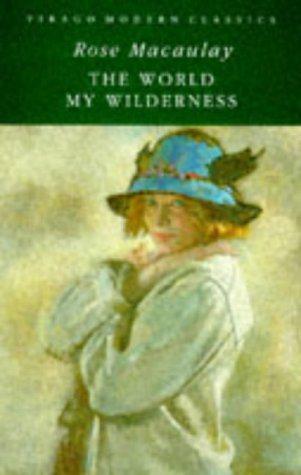
What a beautiful and peculiar book. Rose Macaulay’s The World My Wilderness was her second to last novel. The first after a ten-year hiatus brought on by a lot of heartache and sorrow. In 1939 she caused an accident in which her lover was injured; in 1941 her apartment was bombed and she lost almost all of her possessions and then in 1942 her lover died. Before that Rose Macaulay was a successful author of mostly satirical books. The World My Wilderness is quite different; it’s a compassionate book that reflects her own sorrows as well as other elements of her biography, like childhood years spent in Italy.
The book is set in the South of France, London, and Scotland. The main character, 17-year-old Barbary, is sent to London to live with her father and go to art school. The war is over and her mother Helen wants to get rid of her for different reasons. She and her step-brother have gone wild during the war. They joined the maquis (resistance), and may or may not have been involved when Helen’s second husband, Barbary’s stepfather, known as collaborator, was killed by the resistance.
Barbary’s father has remarried as well and Barbary and her new stepmother, a very conventional woman, clash immediately. Barbary is profoundly miserable, misses her mother and France, but finds solace in the company of her stepbrother. Together they explore the ruins around St.Paul’s cathedral and discover that this wasteland bears some resemblance with their beloved maquis. The ruins are like a wilderness, and, like the maquis, populated by petty thieves and delinquents. Barbary, who is a talented painter, draws postcards of the ruins and sells them to tourists.
The main story is about whether or not Barbary will be allowed to see her mother again and return to France. But since this isn’t a plot-driven novel, its strengths lie elsewhere. This is a book full of lush descriptions and fascinating characters. They are all flawed and complex and whenever we think, we know them, they do something that surprises us. One technique that contributes to see the characters in all their complexity is a frequent change of point of view. Often we’re introduced to a character, seeing him/her through her own eyes and then, right afterwards, we see them through the eyes of others. The result is quite arresting. My favorite character was Helen, Barbary’s mother. She’s a free-spirit who loves art, men, freedom, and a good life. Conventions are not for her. In France she lives as she likes, while she was a constant source of scandal and gossip in London.
Here’s Helen’s take on country and family:
“One understands so well,” said Helen, languidly teasing a small green lizard cupped in her hand, “the desire not to work; indeed I share it to the full. As to one’s country, why should one feel any more interest in its welfare than in that of other countries? And as to the family, I have never understood how that fits in with the the other ideals—or, indeed, why it should be an ideal at all. A group of closely related persons living under one roof; it is a convenience, often a necessity, sometimes a pleasure, sometimes the reverse; but who first exalted it as admirable, an almost religious ideal?”
I expected The World My Wilderness to be a lot like Mollie Panter-Downes One Fine Day but it’s much more like a novel by Colette. Helen herself reminded me a lot of Colette and some of her heroines. She’s such an uninhibited, freethinking, sensual woman. While Helen is a cheerful woman, in love with life and love, she’s also a tragic figure because she was deeply in love with her second husband.
The World My Wilderness is also excellent in the way it describes post-war London with its ruins and struggling population. Everything is still crumbling—the houses and the society. It’s a world in change in which destruction is found right along a wild, mysterious beauty.
Summer slipped on; a few blazing days, when London and its deserts burned beneath a golden sun, and the flowering weeds and green bracken hummed with insects, and the deep underground cells were cool like churches, and the long dry grass wilted, drooped, and turned to hay; then a number of cool wet days, when the wilderness was sodden and wet and smelt of decay, and the paths ran like streams, and the ravines were deep in dripping greenery that grew high and rank, running over the ruins as the jungle runs over Maya temple, hiding them from prying eyes.
I wish I had been able to review this book right after I finished it but that was just before German Literature Month. It would have deserved a more careful review. I still hope you can tell, that I loved it. It’s a marvelous novel.
